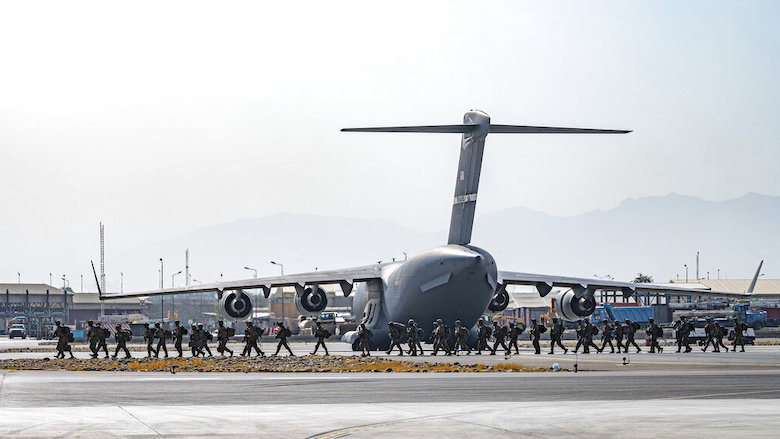Biden defends Afghan decision, says he acted on the basis of consensual view

WASHINGTON, DC (Kurdistan 24) – US President Joe Biden defended his Afghan policy on Friday and took a few questions from journalists. He outlined a somewhat expanded capacity to evacuate Americans and others wanting to leave Afghanistan, while repeatedly affirming that he had acted on the basis of the consensual intelligence position.
In a televised address, Biden vowed to get all Americans out of Afghanistan who want to leave. He also made the same pledge to America’s Afghan partners.
The Taliban control Kabul, including the roads to the airport, and many people in the capital who want to leave cannot even reach the airport. It is yet more difficult for those further away.
It now appears that some arrangements are being made to make contact with those outside Kabul at “predetermined pick-up sites,” where helicopters can take them to safety, as the Associated Press reported on Friday.
Why Biden is Pulling US Troops from Afghanistan
Biden again explained his reasons for leaving Afghanistan. It is no longer the threat it once was, and that threat essentially ended with the 2011 assassination of Osama bin Laden (who was, in fact, in Pakistan).
“Just imagine,” Biden said on Friday, “If bin Laden had decided, with al-Qaida, to launch an attack from Yemen. Would we ever have gone to Afghanistan?”
It is important to recognize that Biden’s decision is not a signal of his intent to disengage from the fight against terrorism, but to focus it more effectively.
Indeed, Senator Angus King (Independent-Maine) supports the Kurds and appreciates their role in fighting ISIS. His position on Afghanistan is similar to Biden’s.
King recently met with the Representative of the Kurdistan Regional Government in Washington, Bayan Abdul Rahman, and “praised the Peshmerga for their critical role and partnership with US forces.”
Yet in the June 19, 2018, confirmation hearing for Lieutenant General Austin Miller to become head of US and NATO forces in Afghanistan, King asked why Afghanistan was so important.
“The question I am struggling with is that the fundamental premise of our presence in Afghanistan now for 17 years is the safe haven argument, that Afghanistan is a safe haven,” King said.
“It was a safe haven for al-Qaida at the time of September 11,” but “what makes Afghanistan so peculiarly safe as opposed to Pakistan, Iran, Iraq, Africa, [or] Syria?” the senator asked.
“I am genuinely trying to understand why all the blood and treasure goes into one country,” he continued, “if the enemy can simply set up a tent city in the middle of the Sahel or somewhere in Pakistan or somewhere in Iran.”
Miller had no answer to the senator’s question. Indeed, this reporter served as a cultural advisor to the US military in Afghanistan a decade ago and had the same question then, as King asked in 2018, and as Biden asked on Friday.
Blame Game: US Intel Tries to Pass the Buck
The US exit from Afghanistan has been badly botched. The underlying reason is the failure to anticipate the possibility of a rapid collapse of the Afghan government and army, as Jeh Johnson, Barack Obama’s Homeland Security Secretary, explained on Friday.
If the Pentagon had understood that, Johnson said, they would not have left the Bagram Air Base. It is a huge facility that dates back to the Soviet invasion of Afghanistan (if not before), is easily defended and is a mere 70 kilometers north of Kabul.
With appropriate recognition of the risk of a sudden Afghan collapse, the US military would have carried out the evacuations from Bagram and then left the base, after that operation was completed.
“The timeframe of a rapid collapse, that was widely estimated,” Gen. Mark Milley, Chairman of the Joint Chiefs of Staff, stated on Wednesday, “ranged from weeks to months and even years following our departure.”
“There was nothing that I or anyone else saw that indicated a collapse of this army and this government in 11 days,” he added.
Jens Stoltenberg, NATO Secretary-General, said much the same on Friday, following a meeting of NATO foreign ministers.
“The speed of the collapse of the Afghan political and military leadership and armed forces was not anticipated,” Stoltenberg said.
In short, the intelligence agencies of all countries involved with NATO in Afghanistan seem to have failed to anticipate what actually happened.
Yet elements within the US intelligence community have sought to portray the situation as a policy failure, rather than an intelligence failure. Thus, on Tuesday, The New York Times carried a report entitled, “Intelligence Warned of Afghan Military Collapse, Despite Biden’s Assurances.”
“Classified assessments by American spy agencies over the summer painted an increasingly grim picture of the prospect of a Taliban takeover,” the Times said. “The drumbeat of warnings over the summer raise questions about why Biden administration officials, and military planners in Afghanistan, seemed ill-prepared to deal with the Taliban’s final push into Kabul.”
As Biden said on Friday, echoing Milley and Stoltenberg, “The consensus was that it was highly unlikely that in 11 days, they’d collapse and fall, and the leader of Afghanistan would flee the country.”
In defending his decision, Biden cited the cost of the Afghan war over the past 20 years. From “a minimum of $1 trillion,” he said, to, perhaps, as high as $2 trillion, the estimate from one university.
Yet already in December 2001, the Bush administration believed that it had won the Afghan war—after a mere three months and with minimal casualties, and they began to prepare for the war in Iraq.
Of course, their understanding of the situation in Afghanistan was quite wrong and it invites the question: what else did they get wrong?
The common answer is the war in Iraq itself, but, perhaps, the right answer is otherwise, and there was a basic failure to understand al-Qaida, what it was, and how it managed to carry out some of its more spectacular attacks.
